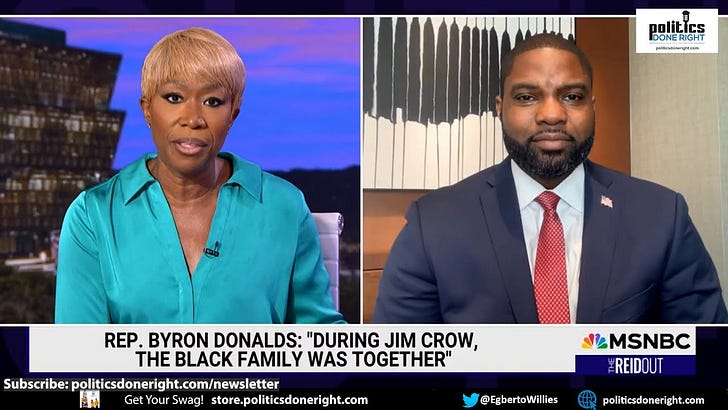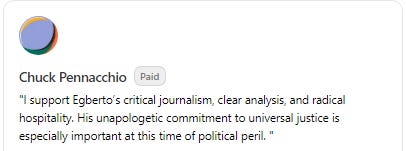Black Republican Rep Byron Donalds' statement on black marriage and Jim Crow was purposeful
GOP Rep. Byron Donalds implies it was better for the black family during the Jim Crow era, a dog whistle for his MAGA base. Joy-Ann Reid did some excellent journalism to dissect his false narrative.
A quick but important note before reading this prescient article
Effective today, we have 9.92 thousand followers and 102 supporting (paid) subscribers. WE NEED HUNDREDS MORE, especially in this political climate. Misinformation funded by the deep pockets of our Oligarchy floods the internet. We are using all our platforms on-air, online, and in publications to counter that. We ask that you invest the equivalent of less than a coffee to ensure we can keep doing this. Please invest in a Democracy that serves all of us by becoming a paid subscriber. It comes with many benefits.
Byron Donalds used ‘Jim Crow’ Black purposefully.
In a recent town hall-like event aimed at rallying support for Donald Trump among Black voters, Florida Republican Representative Byron Donalds made controversial remarks linking the strength of Black families to the Jim Crow era. His statements have ignited widespread condemnation from political and civil rights leaders, including House Minority Leader Hakeem Jeffries, the Congressional Black Caucus, Democratic National Committee Chairman Jaime Harrison, and NAACP President Derrick Johnson.
Understanding the Context
Donalds’ comments about the Black family during Jim Crow were not offhand but rather seemed deliberately crafted to appeal to a specific audience. He suggested that during the Jim Crow era, Black families were more cohesive and that this era also saw a higher rate of conservative values among Black people. His remarks imply a correlation between the oppressive conditions of Jim Crow and the purportedly stronger family structures of that time. This narrative is not only misleading but also dangerously revisionist.
Jim Crow laws, enacted from the late 19th century until the mid-20th century, were designed to enforce racial segregation and disenfranchise African Americans. These laws deprived Black people of basic rights, including the right to vote, access to quality education, and the ability to secure fair employment. The social and economic conditions under Jim Crow were harsh, and any semblance of family unity was a survival mechanism against systemic oppression rather than a testament to the era’s social policies.
The Flawed Logic of Donalds’ Argument
Rep. Donalds’ assertion that Black families were stronger during Jim Crow overlooks the brutal reality of the period. Families were often torn apart by violence, economic hardship, and state-sanctioned discrimination. Lynching, arbitrary arrests, and other forms of racial terror were commonplace, undermining the safety and stability of Black households. The anecdote shared by Joy-Ann Reid during her interview with Donalds, recounting the lynching of Willie James Howard, starkly illustrates the violent disruption of Black families during this era.
The idea that Black families thrived under such oppressive conditions is not only historically inaccurate but also deeply insensitive. It disregards the immense suffering endured by African Americans and falsely romanticizes a period marked by systemic racial violence and economic disenfranchisement.
The Political Motive Behind Donalds’ Remarks
By invoking Jim Crow in a context that suggests positive outcomes for Black families, Donalds seems to be engaging in a form of political dog-whistling. This rhetoric is designed to resonate with a conservative base that often downplays the severity of racial oppression in America’s history while simultaneously appealing to Black voters through a misguided notion of traditional family values.
Donalds’ comments can be seen as an attempt to align himself with the Republican Party’s broader strategy of courting Black voters by emphasizing values like family unity and economic self-sufficiency. However, this approach ignores the systemic barriers that have historically hindered Black families from achieving these ideals.
The Broader Implications
The controversy surrounding Donalds’ remarks highlights a troubling trend within certain political circles: the distortion of historical facts to serve contemporary political agendas. This revisionist approach not only undermines the experiences and struggles of those who lived through Jim Crow but also misleads current and future generations about the true nature of racial oppression in America.
As progressive voices argue, the key to strengthening Black families lies not in revisiting or romanticizing oppressive eras but in addressing the structural inequalities that persist today. This includes advocating for policies that promote economic justice, educational equity, and criminal justice reform. It requires acknowledging the historical and ongoing impact of systemic racism and working towards a society where all families can thrive without fear of discrimination or violence.
Conclusion
Rep. Byron Donalds’ statements on Black marriage and Jim Crow were not mere gaffes but purposeful rhetoric aimed at advancing a specific political narrative. By distorting the realities of the Jim Crow era, he attempts to appeal to conservative voters while neglecting the true nature of the period’s impact on Black families. This approach is not only historically inaccurate but also politically and morally irresponsible.
The progressive response to such rhetoric must be rooted in truth and a commitment to addressing the root causes of inequality. By promoting policies that genuinely support the well-being of all families, progressives can counteract the harmful narratives that seek to divide and mislead. As the nation moves forward, it is crucial to remember past lessons and strive for a future where justice and equity are not just ideals but lived realities for all.
Can we count on you to help us reach our goal of 100 new paid subscriptions by month’s end?
The other side has big donors and everyday citizens who invest heavily in platforms that lie and misinform. All we have is you. So, please invest in our media outlet by clicking the subscribe button below to become a paid subscriber. You won’t miss that coffee, but it will make a difference in our politics as we spread the truth about our policies and progressive politics. All paid subscribers get to read my five books on this platform and all subsequent books I write. They will also be privy to subsequent incentives.







